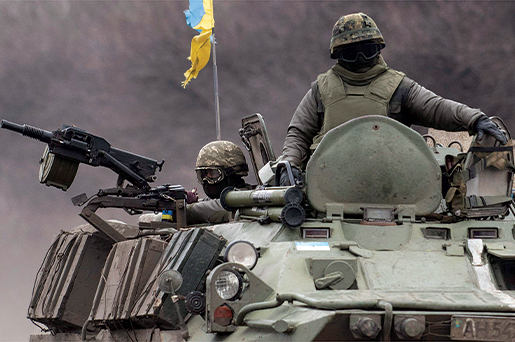Putin takes advantage of the West’s disarmament
The second Minsk Agreement to end the fighting in eastern Ukraine, signed in mid-February 2015, may or may not hold up, but the entire mess in Ukraine will not be resolved until the North Atlantic Treaty Organization does a sharp U-turn on the unilateral disarmament it has been engaged in for close to a decade.One of the silliest Western reactions to Russian military intervention in Ukraine—including its illegal annexation of Crimea and its continuing support in both men and heavy equipment in the fighting in the Donbas region—is that Russia is not acting in accordance with norms of international behaviour of the 21st century. The best answer to that complaint is, “So?”
Communism was defeated when the Cold War ended because the United States and its NATO allies, including Canada, wielded a credible deterrent to possible Soviet military depredations. On the strategic level, Mutually Assured Destruction (MAD for short), deterred the Soviets from attacking North America or Europe with nuclear weapons.
Deterrence is not a complex idea, no matter what international relations or strategic studies experts may say. It is the notion that if you hit me, I will hit you back with a force that is equal to or greater than your initial attack. If the deterrent is credible, it will establish a balance of armed belligerents who will live within their own spheres of influence either by mutual agreement or mutual understanding.
In the past 10 years, deep budget cuts in defence spending in Europe and North America have undermined our deterrence. Our diplomatic wobbling has conveyed the idea that there is nothing we are prepared to fight for except to find non-existent weapons of mass destruction in Iraq (Canada, of course, excepted) or to make Afghanistan a shining example of Western-oriented values in central Asia. Thus, Russian President Vladimir Putin learned through his invasion of Georgia in 2008 and his annexation of Crimea last year that he is more ready to use military force to achieve his geopolitical objectives than we are to defend against him.
None of us has any reason to believe that military power is any less effective today in preserving international order than it has been for centuries. We do now have the International Criminal Court, the United Nations, and a well-developed body of international law, but there is no international government and no international police to enforce any of it. Nations that wish to arm themselves and are ready to use military power to achieve their national objectives will do so unless they will face consequences, including military consequences, to dissuade them.
In March, Canada’s new Minister of National Defence Jason Kenney mused about the possibility of sending Canadian troops to help train Ukrainian defence forces. He is right to do so. No sane person can want all-out war between NATO and Russia; such a conflict could be the end of civilization as we know it. But Vladimir Putin and his military and foreign policy advisors must know that, too. The only way we can avoid the incremental expansion of Russian power in Central Europe and the Baltic region is to begin a rapid rearmament of our own, to rebuild our deterrent, while making sure to keep diplomatic channels to Moscow open at all times.
It simply won’t do for us to continue sleepwalking through the international arena believing that the turn of the 21st century has somehow brought a new era of Kumbaya to humankind. Kumbaya can work, as long as everyone in the circle knows that good old-fashioned deterrence will keep the peace of the whole group. For Canada, that should translate into a heavy, well-planned and sustainable increase to the defence budget and an active diplomatic role in putting greater backbone into some of our NATO allies.
Advertisement























